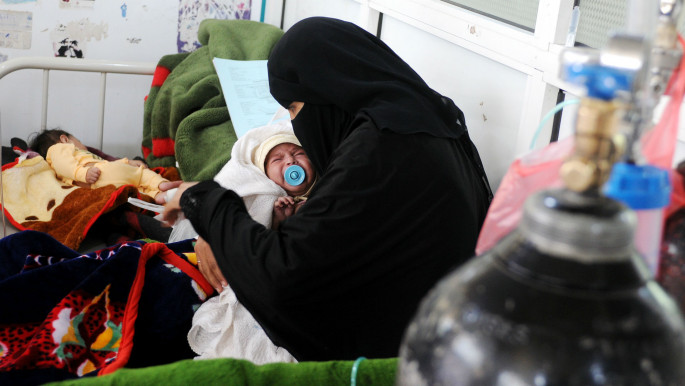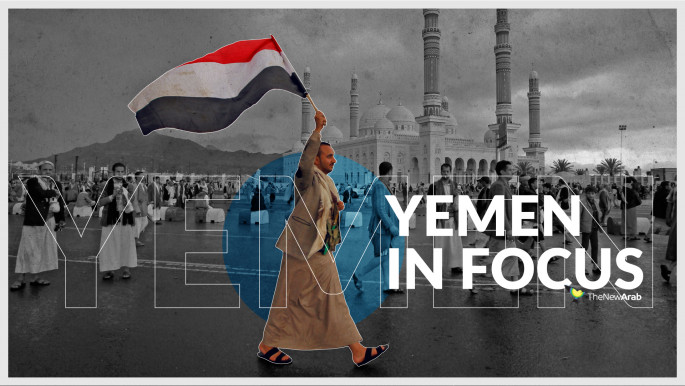Yemen in Focus: The 'most destructive conflict' since Cold War
The UNDP report sheds light on the humanitarian and economic impact of the conflict, which has set the region's already poorest nation back at least 21 years.
"If the war ends in 2022, development gains will have been set back by 26 years – almost a generation. If it continues through 2030, that setback will increase to four decades," the report states.
Shocking statistics showed that Yemen ranked 153 on the Human Development Index, 138 in extreme poverty, 147 in life expectancy, 172 in educational attainment and was already on the World Bank's low-middle income category, according to the report.
"Human development has not just been interrupted. It has been reversed," asserted UNDP Yemen Resident Representative, Auke Lootsma.
"Even if there were to be peace tomorrow, it could take decades for Yemen to return to pre-conflict levels of development. This is a big loss for the people of Yemen."
The report showed Yemen's loss of economic output will increase to $181 billion in 2022 from $89 billion in 2019, depending on when the conflict ends.
 |
Even if there were to be peace tomorrow, it could take decades for Yemen to return to pre-conflict levels of development. This is a big loss for the people of Yemen |  |
That figure is expected to rocket to a whopping $657 billion in 2030 should the war continue till then, the report warned. The study also estimates that 71 percent of Yemen's population will be living in extreme poverty while 84 percent will be malnourished by 2030.
"The long-term impacts of conflict are vast and place it among the most destructive conflicts since the end of the Cold War," states the report.
Further deterioration of the situation "will add significantly to prolonged human suffering, retard human development in Yemen, and could further deteriorate regional stability," the report added.
More than four years into the Saudi-Emirati war on the Houthi rebels in Yemen, recent figures by ACLED suggest that more than 70,000 have been killed since the coalition intervened to reinstate the government following the rebels' takeover of the capital.
Sell our oil
Meanwhile the Houthi rebels had their own suggestions to alleviate the country's economic woes this week.
Head of the rebel's Supreme Revolutionary Committee Mohammed Ali al-Houthi on Tuesday advised the United Nations to assist in the sale of Yemeni crude oil, which he said could then be used to help in the financing of fuel imports and payments of public sector salaries via the central bank.
 |
|
| Read also: Yemen in Focus: Tragedy strikes pregnant mothers and newborns |
The rebel leader made the request as a storage tanker believed to hold more than a million barrels of crude oil continued to float off Yemen's coast for the fourth year running.
"We call on the UN and the Security Council to put in place a mechanism to sell Yemeni crude oil, including the oil in the (floating storage tank)," al-Houthi urged on Twitter.
Revenue from the oil sales could foot Yemen's public sector salary bill, which has yet to be paid since August 2016. Al-Houthi took aim at those pushing the Iranian-Houthi links in Yemen, noting the move would also "prevent the arrival of Iranian oil" into the country.
Yemen's oil production and export, which was heavily relied on by the former, pre-conflict government, has come to a near halt due to the war.
The conflict, which intensified when the Saudi-led coalition intervened in March 2015, forced Yemen's public infrastructure to all but collapse, leaving public sector workers, including the country's dwindling health sector, unable to survive.
Al-Houthi suggested that the remaining revenue could be evenly split between Yemen's two central bank branches, divided into two along the lines of the warring side. In the southern port of Aden, the Saudi-backed government's central bank rivals that of the Houthi rebels in Sanaa.
This split has inevitably led to payment problems, worsening an incredibly dire situation described by the UN as the "world's worst humanitarian crisis".
Detained and tortured
Meanwhile, ten Yemeni journalists currently detained by Houthi rebels in the war-torn country have seen increased support from around the globe this week after Amnesty International on Wednesday threw its weight behind their cause.
The rights group criticised the lengthy detention of the journalists who have been tortured, held in solitary confinement and deprived of medical care.
The detention of media workers in Yemen reflects "the dire state of media freedom" in the war-ridden country, Amnesty said.
The journalists have been held since the summer of 2015 and are being prosecuted on alleged spying charges and cooperating with the Saudi-led coalition.
 |
The unlawful and prolonged detention, torture and other ill-treatment of these 10 journalists is a shocking reminder of the repressive media climate facing journalists in Yemen |  |
Amnesty has slammed the charges as "trumped-up" and said some of the journalists worked for online media outlets affiliated with Al-Islah, an Islamist party that opposes the Houthi rebels.
The group said in a press release that the media workers have been tortured, held in solitary confinement and deprived of medical care.
"The unlawful and prolonged detention, torture and other ill-treatment of these 10 journalists is a shocking reminder of the repressive media climate facing journalists in Yemen and illustrates the risks they face at the hands of all parties to the conflict," said Rasha Mohamed, Amnesty's Yemen researcher.
"These men are being punished for peacefully exercising their right to freedom of expression. The de facto Houthi authorities should release them immediately and drop all the charges against them," the researcher said in a statement.
Train to kill
In Europe, question marks propped up among activists who had earlier praised Germany for ending its arms sales with Saudi Arabia, after reports revealed Berlin was still pretty much involved in the conflict.
Reports this week confirmed that the German army will train seven Saudi soldiers from the coalition, five of whom are due to begin their officer training course in July while the other two will receive training with the German air force.
German language courses will be provided to seven more Saudi soldiers in July, before the force begins training in 2020.
The programme was initiated as part of 2016 agreement made between German Defence Minister Ursula von der Leyen during an official trip to Saudi Arabia.
Last year, Germany was widely praised for imposing a ban on Saudi arms sales following the killing of Saudi journalist Jamal Khashoggi at the kingdom's consulate in Istanbul last year.
In March, Germany extended the ban on arms exports to Saudi Arabia by six months until the end of September.
Merkel's government has faced political pressure at home over overall weapons sales but it has also faced increasing protests from European partners including France and the UK over the issue. The two countries say the ban prevents them selling jointly developed equipment with German components to Saudi Arabia.
Last year, French President Emmanuel Macron dismissed Germany's call for other countries to join an export freeze to Saudi Arabia, saying it was "pure demagoguery to call for a halt".
Germany is among the world's top arms exporters, a group led by the US that also includes Russia, China, France and the UK.
There was a decision to make an exception for arms that are manufactured with other countries – such as the Eurofighter and Tornado jets, when a ban triggered anger from EU partners – France and the UK.
Berlin said it would push for jointly produced weapons not to be used in the war in Yemen and for no "fully assembled" products to be delivered to Saudi Arabia and the UAE through the end of this year.
Germany has a troubled relationship with foreign arms sales, a legacy of its dark past. Polls show that around two thirds of German citizens reject weapons exports.
More news from Yemen, same time, same place – next week.
Sana Uqba is a journalist at The New Arab.
Follow her on Twitter: @Sanasiino
Yemen In Focus is a new, regular feature from The New Arab.





 Follow the Middle East's top stories in English at The New Arab on Google News
Follow the Middle East's top stories in English at The New Arab on Google News


